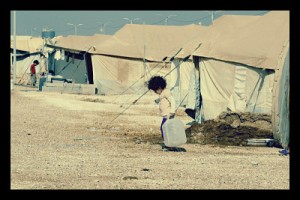Refugee Crisis in Jordan

Half a million people or one third of all refugees from the conflict in Syria. These are the realities of the influx of Syrian refugees that has flooded into Jordan since the start of the conflict.
For two years, Jordan has accepted these refugees, setting up camps hosting up to 100,000 Syrians. The situation, however, has become extreme. With numbers like these resources and supplies have become a major concern. And as a result, Jordan has closed its border with Syria, turning all but critically injured refugees away.
Jordan has yet to give an official explanation for the closure, but their reasons are evident. With no assistance from the outside world, Jordan has been bearing the cost of these refugees for two years now. This includes both running the refugee camps and providing healthcare. And with such crowded living conditions in the camps, rates of infectious diseases continue to climb. Furthermore, as summer approaches, the risk of dehydration increases. All of these conditions place huge demands on the Jordanian government.
Although millions of dollars of international assistance have been pledged, only a fraction has arrived so far. And with a thousand new refugees arriving at the border every day, the strain has become too much. Though the closing of its borders represents a breach of an international obligation to be open to refugees, the international community has avoided criticizing Jordan, likely because the rest of the international community has not stepped in to alleviate the pressure.
While many international organizations are already working in the region, including Médecins Sans Frontières, what is really needed is financial support. These organizations have limited funding, and without the proper infrastructure in place, their impact is limited.
It’s time for the international community to step in, rather than simply allowing the countries like Jordan that neighbor Syria to bear the brunt of the responsibility for the welfare of the refugees.
– David Wilson
Source: Reuters,MSF
Photot: Demotix
